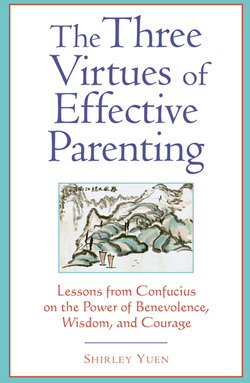Читать книгу Three Virtues of Effective Parenting - Shirley Yuen - Страница 9
На сайте Литреса книга снята с продажи.
ОглавлениеPREFACE
I was born and raised in Hong Kong, and have been exposed to the best and worst of both Eastern and Western culture since birth. My cultural identity was further tested when I attended college and then raised my two children in the United States.
At times I feel the conflicts or discontinuities between Eastern and Western philosophies and values. I tend to act like Aristotle in my quest for personal freedom and then think like Confucius in my concern for a more all-embracing harmony in my surroundings. But in a way, these contradictory focuses have helped me appreciate the best of both worlds, and most important of all, they’ve helped me find balance in the way I respond to what happens around me. Central to my life has been my role as a parent. It is also an arena where I’ve come to appreciate how much Eastern wisdom and Western parenting can work hand-in-hand.
How It All Started
The Eastern philosophy and Western Parenting book collection in my house had always been on two different bookshelves. I studied them both carefully. And separately. But I can still remember the day when the wisdom of Confucius came to the rescue when I was desperately looking for help in one of my parenting books.
It was seventeen years ago . . . I was standing in front of my two-and-a-half-year-old son who was having a tantrum. I can’t remember what he was refusing to do, but I got very angry because he was demanding that I get out of his room. I quickly tried to remember what my parenting books said about situations like this but before I could figure out if this was a “tantrum” or “defying behavior,” my anger seemed to have set fire to everything that I had learned from all of my parenting books.
I could hear myself yelling as loud, if not louder, than the tiny two-and-a-half-year-old monster in front of me. My heart was beating faster than it does in my aerobics class and for a second, I thought I was going to hit my little boy. Then suddenly, at the very back of my mind, I heard a gentle voice that said, “If a person is filled with anger, he will not be able to behave correctly, for then his mind no longer resides in him. He will look but not see; he will listen but not hear. . . .” (Commentary VII from Confucius’ The Great Learning.)
I suddenly stopped yelling. I took my son in my arms and tried to see him as a two-and-a-half-year-old. I tried to hear what he was really trying to tell me. That was the first time that I took the courage to see what I did not see in myself. That was the day that I started to empower myself with the wisdom of Confucius to complement the wisdom of Dr. Spock, Parents Effective Training (P.E.T.), Systematic Training for Effective Parenting (S.T.E.P.) and other Western parenting experts. I started to recognize that it is essential to cultivate virtue if we want to be wise parents who truly care, nurture, and guide our children. It took much learning and thinking to discover that the power of virtue is two-fold: On one hand, virtue helps us to change ourselves so that we become better people; on the other hand, it helps us influence the behavior of people around us in a positive way. How I wish I had realized the significance of cultivating both aspects of virtue earlier, for then I would not have struggled with parenting for so many years.
Good parenting skills are important; while some come naturally, others must be learned. In this book, I hope to share with you the wisdom of Confucius as it relates to parenting. I will present Confucius’ three universal virtues as the means to develop both your relationship with your children and your relationship with yourself. Contained in the three universal virtues are timeless insights; insights that will complement the Western parenting tips and methods you may also be learning. Both the virtues and the parenting skills are vital to help us understand how to best respond to all the complex situations that arise in raising children in the modern world.
Most of the Confucius’ teachings in this book are from Analects, a book which was written by the students of Confucius. Analects, together with Mencius, The Great Learning, and Doctrine of the Mean, are named the “Four Books” of the Confucian Classics.
